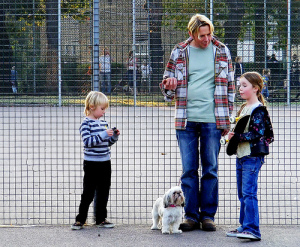About a year ago, I asked the childfree to write in their answer to this On-the-Ground question: What childfree stereotype have you been subjected to most in your life?” I did the “top 10” things people wrote in about, and the #1 thing people said is the same as what I have been getting a lot of email from frustrated childfree recently…
The stereotype has to do with seeing the childfree as the types who just don’t realize that they will eventually want kids. In other words, we may not know it yet, but we will change our minds. A sub-assumption involves finding the right partner – thinking that once the childfree find that special someone they will end up realizing they want to have a baby with that person.
Of late the emails I get from frustrated childfree looking for help and advice has a lot to do with this kind of thinking from others (who are not childfree). Being told this often feels offensive because it sends the message that others know the childfree better than they know themselves. It often hurts childfree people’s feelings-that others somehow don’t see them as having it together enough to know what they truly want.
But why might others be so convinced they are right? Because they are deep into believing the pronatalist assumption that we all will eventually want children. And that deep belief makes it easy for parents and want-to-be parents to think they are “right” about the childfree — that they ultimately won’t want to be.
 I have talked with thousands of childfree over the years, and have to say I have not come across many that had this kind of “revelation” even when they found their partner in life. A small number decided to foster children a variety of ages for a time, or ended up caring for a child from their extended family either because they were most suited or the only one to really take the child. In both cases, the intentions or desires were not rooted changing their minds to wanting to have their own child, but in helping children who are already here who are in need of loving homes.
I have talked with thousands of childfree over the years, and have to say I have not come across many that had this kind of “revelation” even when they found their partner in life. A small number decided to foster children a variety of ages for a time, or ended up caring for a child from their extended family either because they were most suited or the only one to really take the child. In both cases, the intentions or desires were not rooted changing their minds to wanting to have their own child, but in helping children who are already here who are in need of loving homes.
In June, Allison Benedikt at Slate asked if the childfree change their minds by re-contacting the childfree that were interviewed for an article by Lisa Belkin over ten years before. All three interviewed remained without children. However, this is hardly a sample size to answer the change of mind question.
It would be great to see real studies asking this question, and my hypothesis is that the majority of childfree would not change their minds over time. There have been recent studies on sterilization and regret, but this is not the same as the research question about men and women who were once childfree and ultimately had children.
If this kind of research was done with strong sample size and research design, what would your hypothesis be?






Obviously, it would be difficult to track and manage the data in such a linear study. To my mind, to determine how many CF eventually change their minds would have to examine both genders, as well as various age groups. For example, it would have to look at women in their 20s and 30s for up to, say, 30 years (at or after menopause). Male participants would be even more difficult to study, as men remain fertile throughout their entire lives. I would expect more women in their early 20s to change their minds compared to women in their mid to late 30s; and, if a study examined CF women in their 40s, almost no change of heart. If such a study were conducted that included both genders I would also expect that fewer men, regardless of age, would change their minds compared to women, who are subject to more pronounced social pressures. (Did I answer the question right? 😉
The age at which the study could begin would be important and I agree if you started with them in 40s I be there would not be a change of heart-or very little. But what about a longitudinal study that tracked women over a period of time and starting in 20s? I don’t think it would have to be be 30 years, but at least 10…More childfree men changing their minds compared to women hypothesis — Mmmm – childfree guys, what do you think?
I would be very interested in a long-term study like that. I would be happy to participate or even help design and conduct one.
A good counter to the “you’ll change your mind” bingo is to ask the person to put a wager on it. If you’re so sure that I’ll change my mind, are you willing to bet $1000 on it? No? Why not, if you’re so sure I’ll change my mind? Perhaps you think I might not change my mind?
That is a great comeback – Going to share that one! ~L
I would hypothesize that those most likely to change their minds would already have kids! What I mean is that I suspect more vasec/tubal reversals are performed on parents, not people who never wanted kids. (this would be difficult to study, though, because it can be so hard for the childfree to get the surgery). I would also like to know about the child free as kids themselves. I’ve noticed some common traits: not playing with dolls, not liking other little kids, being an older sibling. I knew I didn’t want kids very young, but couldn’t articulate it until I was a teenager. Just think there might be some observable childhood characteristics, sort of like an orientation if you will.
Molly, I would hypothesize the same – that those who are more likely to change their minds were not childfree in the first place. Of course the studies, or the ones that I have seen to date, don’t ferret out the samples well enough or even obtain samples to study it this way. Leaving out pre-sterilization status-kids/no kids (and why on the latter) is just another way to more easily say “See-you will regret it” – a pronatalist-fulfilling prophecy. Even with the percentages we do see, they are low – from 6-20% range from studies I have seen – that means 80-94% don’t regret in any case!
Laura, I’ve seen many posts from women who deeply regretted HAVING children, from sites with names like “Hate being a mother” and titles along those lines. From what I have read, a lot of these women were pressured by family members, religious community, or other sources to have kids. Instead of telling the “bingo brigade” members to mind their own business, the women caved in and have been miserable ever since.
Thankfully, I’ve never been one of the regretful parents, and for me, that is due to my resolve never to cave in and have more than one child. I really do mean it when I say I’m cheerfully DONE after one. 🙂
I thought of another possible comeback for the CF folks when they get either the “you’ll change your mind” or “you’ll regret your decision one day” bingo. It’s a simple two-word response: “You WISH.”
To a large degree, I think those who make those judgmental remarks really DO wish the CF will regret their decision and are spitting mad when they don’t. I used to get similar bingo barbs from folks when I told them I enjoy having just one child and had no desire or intention to have more. Not one of the CF folks in my family have ever regretted their decision NOT to have children, and I have never regretted my choice to stop at one.